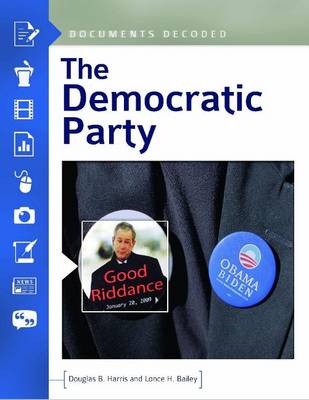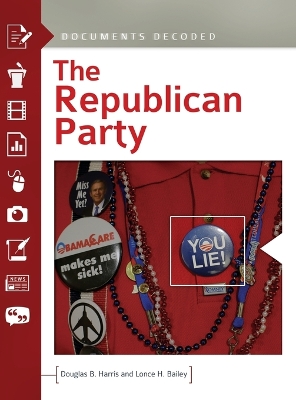Documents Decoded
2 total works
Through an examination of key historical documents, this book chronicles the Democratic Party's complete transformation from the small-government, Jeffersonian party to a party of activist government and social progressivism during the presidencies of Franklin D. Roosevelt, Lyndon Johnson, Bill Clinton, and Barack Obama.
What are the objectives of today's Democratic Party, and what historic events have guided its evolution from a decidedly different ideological starting point more than 200 years ago? The Democratic Party: Documents Decoded supplies a thorough historical examination of the Democratic Party from its distant origins in George Washington's administration to the two-term administration of Barack Obama. Told through key documents and speeches, this history comes alive in the words and thoughts of those who built, sustained, and transformed the Democratic Party. No other book uses documents in this way to tell a comprehensive history of this party.
The book utilizes primary documents to investigate a breadth of topics such as the Democratic party's positions on civil rights, discrimination, voting rights, taxation, representation, immigration, primary elections, caucuses, the Republican opposition, relations between church and state, the role of government, and foreign policy. The scholarly commentary provides essential context that bridges the gaps between documents and insightful explanations and clarifications of specific passages or terms to ensure reader comprehension. A work unlike any other on the history of the Democratic Party, this book will serve advanced high school students in government and history classes as well as undergraduate students taking courses in political science and history.
- Supplies a chronological history of the Democratic Party over the course of more than two centuries as told in documents
- Covers presidential and party rhetoric ranging from George Washington's 1796 farewell address to Barack Obama's 2013 inaugural address
- Details the transformation of the Democratic Party from a small-government party that supported slavery and segregation to a progressive party that defends civil rights and provided the nation's first African-American president
Will the modern Republican Party be able to convince the American people that its policies and positions are the right ones to guide the United States? This book examines the status of the Republican Party in the early 21st century, considers where it came from, and predicts where it's heading.
An ideal research tool for advanced high school students in government and history classes as well as undergraduate students enrolled in political science and history courses, The Republican Party: Documents Decoded presents documents, transcripts of speeches, photographs, political cartoons, and campaign materials to define the status of the Republican Party in the early 21st century.
Focusing on its leaders, key principles, organization, and the basis of its political support, the book provides readers with the knowledge and understanding to answer the key questions: For what does the party actually stand? What must Republicans do to move past recent negative perceptions of their party? And can it reclaim the White House in 2016? The source documents and commentary by expert scholars will help students and readers to analyze and evaluate the content themselves in order to reach their own conclusions of where today's Republican party stands on the key issues, such as health care reform, relations between church and state, foreign policy, education, reproductive rights, gun control, and immigration.
- Presents photographs and other visual elements that complement the story of the Republican Party
- Provides scholarly commentary and analysis on more than 60 primary documents that show students how the Republican Party has evolved over the decades, as well as the values, priorities, and political strategies of its current leadership
- Includes a bibliography containing books, media, and websites that directs readers to additional sources of information

